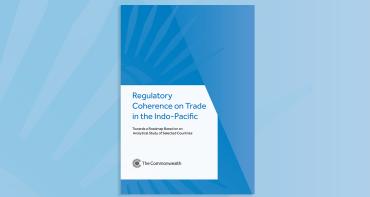The Commonwealth Secretariat and the Organisation Internationale de La Francophonie (OIF) - two global organisations whose members include about 100 of the worlds’ poorest, smallest and most vulnerable countries, with a population of about 2.5 billion people, are seeking to provide a series of practical inputs to the development agenda of the G20 – a Group of the world’s most advanced and emerging economies.
As part of this initiative, the two organisations are organising a joint meeting in Cape Town, South Africa, on 28 June 2011, aimed at providing practical ideas on how to include the concerns of the most vulnerable of their members.
The conference will take place shortly before – and at the same venue as - the meeting of the G20 Development Working Group (DWG), at the Cape Town International Conference Centre.
At their meeting in Seoul, South Korea, in 2010, G20 leaders, released the G20 Multi-year Action Plan for Development, and mandated the DWG to pursue it.
The Plan focuses on nine key development challenges. These comprise of: infrastructure, human resources development, trade, private investment and job creation, food security, growth with resilience, financial inclusion, domestic resource mobilization, and knowledge sharing.
These are issues the G20 leaders consider as significant bottlenecks to increasing and maintaining growth in many developing countries.
Dr Cyrus Rustomjee, Director of the Economic Affairs Division at the Commonwealth Secretariat, and one of the organisers, said that the Cape Town meeting will focus on suggesting key action points in three of the nine areas identified by the G20 DWG: promoting growth with resilience; ensuring financial inclusion; and promoting effective participation of the world’s poor countries in global trade—to create jobs and improve livelihoods.
“These issues rank among the most crucial challenges for these countries, in securing sustainable growth, effectively participating in global trade and widening and deepening domestic financial markets to ensure the participation of the unbanked and small and medium enterprises,” Dr Rustomjee said.
Dr Rustomjee said that it is also crucial for the international community to support efforts to promote financial inclusion-- access to finance for households and small and micro enterprises in small and poor developing countries.
He said that growth without considering resilience – the ability to cope with external shocks-- in tough times, cannot be sustainable.
Dr Rustomjee further said that the world’s poorest, smallest and most vulnerable countries also need to be afforded much better and more concessional access of their exports to developed and emerging countries’ markets.
On his part, Herve Cronel, a Special Advisor to Secretary-General of La Francophonie on Economic Policy and Sustainable, said that for over 30 years, The Commonwealth and La Francophonie have worked extensively and detailed insights on the unique development challenges of small island states, vulnerable economies and least developed countries.
“We have a detailed understanding of some of the potential solutions to these challenges. From our combined analytical research and advocacy work, it is clear that the two organisations have the capacity to provide some practical ideas and options to the G20 initiatives to address the world’s most pressing development problems,” Mr Cronel said.
The Commonwealth and La Francophonie have been actively involved in contributing ideas to the G20 in recent times.
In June 2010, during Canada’s chair of the G20, Prime Minister Stephen Harper invited the Secretaries-General of the two organisations to Ottawa to provide input ahead of the Toronto Summit.
Later in 2010, the two organisations were again afforded an opportunity to contribute ideas and proposals ahead of the G20 Summit in Seoul, South Korea.
“Between the Commonwealth and La Francophonie are seven G20 members. This offers a valuable opportunity for the large members of developing countries in the two associations to provide a useful platform at which matters of mutual interest can be discussed, good practices distilled and solutions proposed in a consensual manner,”Mr Cronel said.
Note for Editors
About the Commonwealth
The Commonwealth is composed of 54 member countries representing 2.1 billion people, aggregating almost a third of the world’s population.
Commonwealth objectives include the promotion of democracy, human rights, good governance, the rule of law, individual liberty, egalitarianism, free trade, multilateralism and world peace.
With the large majority of the Commonwealth’s membership comprising small, poor and vulnerable members, a substantial part of its work on vulnerability, growth and resilience has focused on the 32 small states of the association, where building resilient growth has represented an extraordinary challenge.
Over a period of several decades, the Commonwealth has been a pioneer in drawing international attention to the problems faced by small states.
Commonwealth members are: Antigua and Barbuda, Australia, Bahamas, Bangladesh, Barbados, Belize, Botswana, Brunei Darussalam, Cameroon, Canada, Cyprus, Dominica, The Gambia, Ghana, Grenada, Guyana, India, Jamaica, Kenya, Kiribati, Lesotho, Malawi, Malaysia, Maldives, Malta, Mauritius, Mozambique, Namibia, Nauru, New Zealand, Nigeria, Pakistan, Papua New Guinea, Rwanda, Samoa, Seychelles, Sierra Leone, Singapore, Solomon Islands, South Africa, Sri Lanka, St Kitts and Nevis, St Lucia, St Vincent and the Grenadines, Swaziland, Tanzania, Tonga, Trinidad and Tobago, Tuvalu, Uganda, United Kingdom, Vanuatu, Zambia. (Fiji was suspended from the Commonwealth in 2009).
Cameroon, Canada, Cyprus, Dominica, Ghana, Mauritius, Mozambique, Rwanda, St Lucia, Seychelles and Vanuatu also belong to the Francophonie.
About Organisation Internationale de La Francophonie
The international organisation of La Francophonie (OIF) represents one of the largest linguistic zones in the world. Its members share both a common language as well as the humanist values promoted by the French language.
The OIF, or ‘Francophonie’, created in 1970 with its head offices in Paris, aims to embody the active solidarity between its 70 member states and governments (56 members and 14 observers), which together represent more than one-third of the United Nations’ member states and account for a population of more than 890 million people, including 220 milion French speakers.
The OIF organises political activities and actions of multilateral co-operation that benefit French-speaking populations.
Its actions respect cultural and linguistic diversity and serve to promote the French language, peace and sustainable development.
The OIF is composed of 56 member States and Governments: Albania, Principality of Andorra, Armenia, Kingdom of Belgium, French Community of Belgium, Benin, Bulgaria, Burkina Faso, Burundi, Cambodia, Cameroon, Canada, Canada-New-Brunswick, Canada-Quebec, Cape Verde, Central African Republic, Chad, Comoros, Congo, , Cyprus, Democratic Republic of the Congo, Djibouti, Dominica, Egypt, Equatorial Guinea, France, Gabon, Ghana, Greece, Guinea, Guinea-Bissau, Haiti, Ivory Coast, Laos, Lebanon, Luxembourg, Republic of Macedonia, Madagascar, Mali, Morocco, Mauritius, Mauritania, Moldova, Monaco, Niger, Romania, Rwanda, Saint Lucia, Säo Tomé and Principe, Senegal, Seychelles, Switzerland, Togo, Tunisia, Vanuatu, Vietnam. The Observers are: Austria, Croatia, Czech Republic, Georgia, Hungary, Latvia, Lithuania, Mozambique, Poland, Serbia, Slovakia, Slovenia, Thailand, Ukraine.
Many of these are low-income countries, and some also belong to the Commonwealth (Cameroon, Canada, Cyprus, Dominica, Ghana, Mauritius, Mozambique, Rwanda, St Lucia, Seychelles and Vanuatu).



